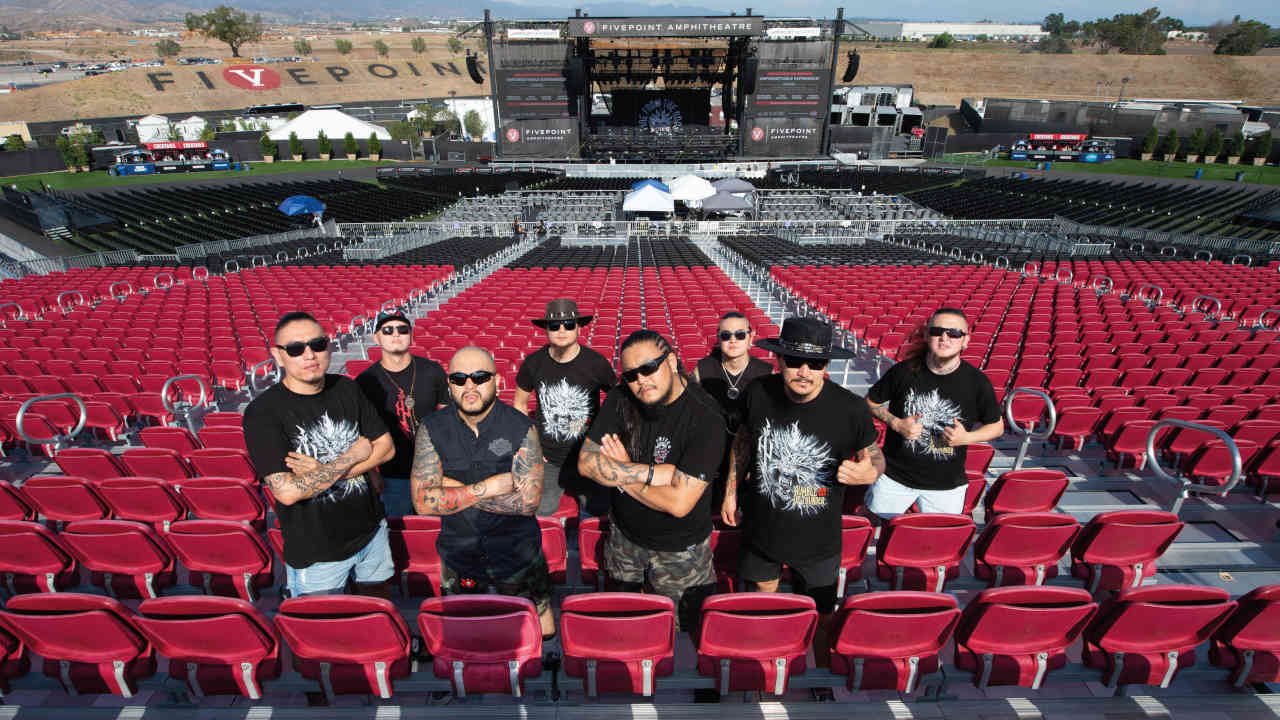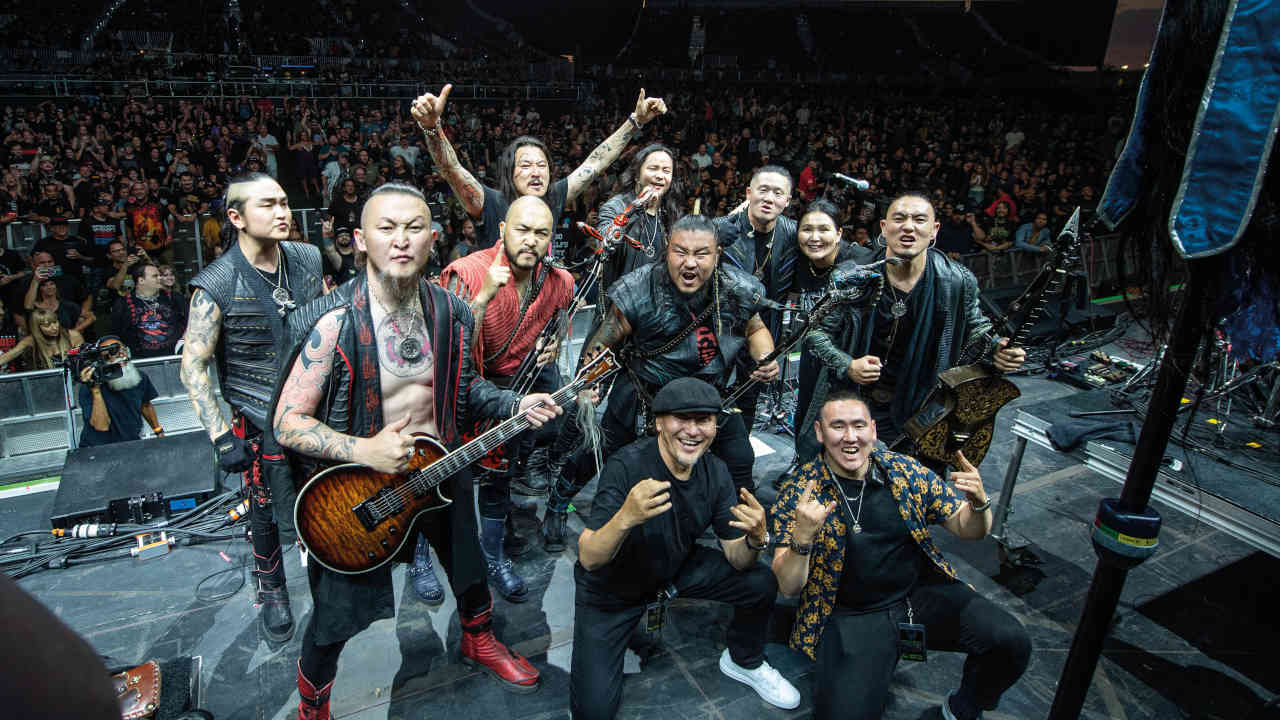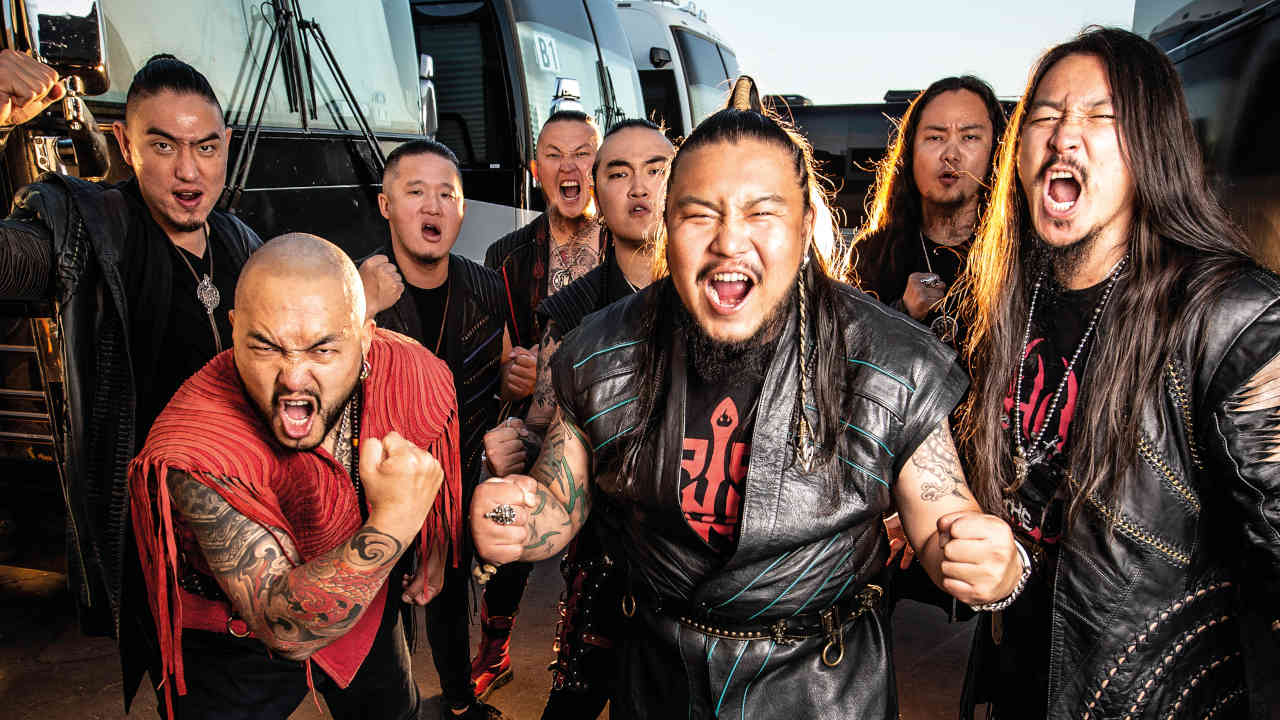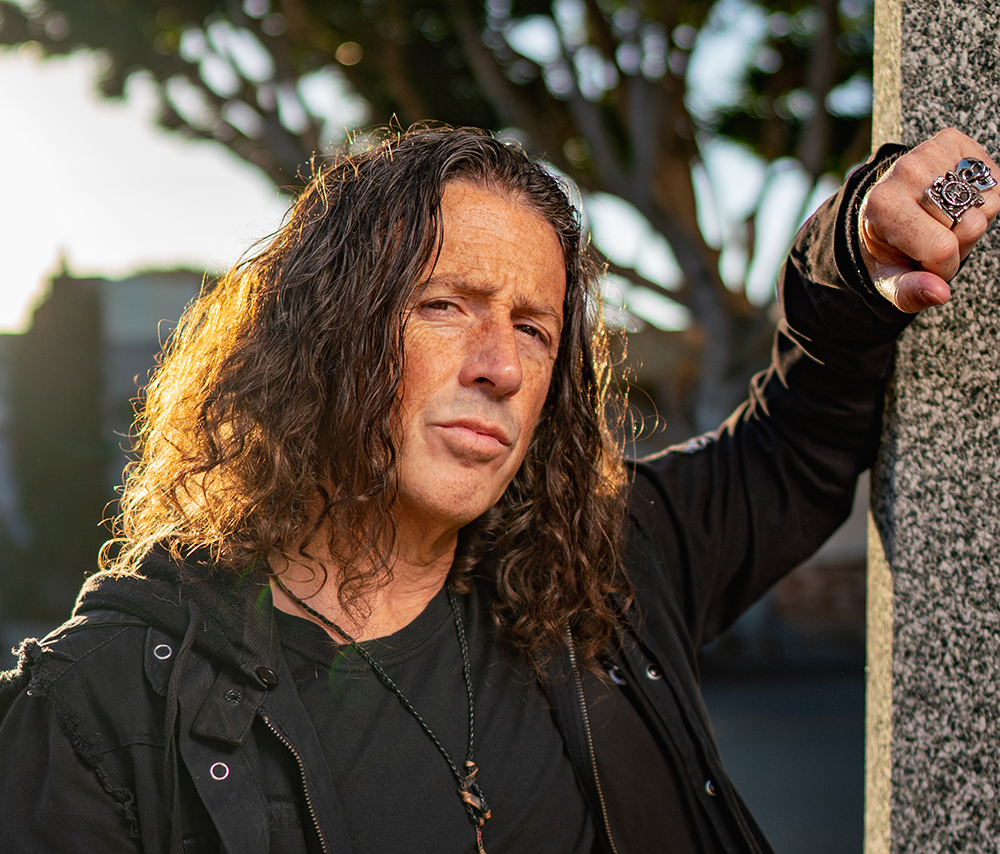On August 22, 2022, Dwayne ‘The Rock’ Johnson posted an Instagram video of himself methodically banging out a set of bicep curls. All in a day’s work for the wrestler turned action hero, except in this post, he’s cranking Wolf Totem by Mongolian folk-metal heroes The Hu. This did not go unnoticed, not least by The Hu themselves.
“You can see the hard work that he’s put into his body,” says Nyamjantsan ‘Jaya’ Galsanjamts, who performs all wind instruments in The Hu as well as being one third of the band’s vocal frontline. “When you work out at that level, you have to tap into a state of mind of total focus and power and he gets there from Wolf Totem. Just the fact that we’re in his workout playlist is amazing!”
The Rock isn’t only celebrity fan to emerge in the wake of the success of The Hu’s 2019’s viral hit single, Yuve Yuve Yu, and debut album, The Gereg. Their legion of supporters includes everyone from Metallica to Elton John, the latter hailing them as “the band of the year”. Lzzy Hale, Papa Roach’s Jacoby Shaddix and From Ashes To New have lined up to collaborate with them, while their recent single, Black Thunder, appears in the new Star Wars Jedi: Fallen Order videogame. It’s been a hell of a reception for a band from a country that doesn’t have a track record of producing globally famous metal bands.
“We love how people have welcomed us and how they’re willing to listen to this new culture and this new style of music that we bring,” says tovshuur player Temuulen ‘Temka’ Naranbaatar (the tovshuur is a traditional Mongolian lute).
The Hu are about to find out just how receptive the USA will be to that new style of music and culture. Ahead of the release of their second album, Rumble Of Thunder, the band have embarked on a massive 32-date arena tour there, opening for heavyweight headliners Five Finger Death Punch and Megadeth.
They aren’t starting from scratch. Yuve Yuve Yu and Wolf Totem, the latter getting a remake with the addition of Jacoby Shaddix, made people sit up and pay attention, while they’re signed to Better Noise, the label founded by Mötley Crüe manager and industry heavyweight Allen Kovac, making them part of the same stable as Five Finger Death Punch and Papa Roach. But this is the biggest step up yet for Mongolia’s most talked-about musical export. The Hu are ready for America. The question is, is America ready for The Hu?

This is The Hu’s third trip to the US, though it’s the first time they’ve played enormodomes such as FivePoint Amphitheatre in Irvine, California, which is where Hammer meets up with them today.
The backstage compound at FivePoint is a quadrangle of maroon-painted trailers lined with tall industrial fans pumping cool air at couches set up in the middle. It’s the fourth date on this tour, and the area buzzes with pre-show activity. Dave Mustaine is chatting with somebody in the far corner, while outside The Hu’s trailer, 5FDP’s Zoltan Bathory and a sparring partner practise judo on a padded mat.
The atmosphere inside The Hu’s trailer is chill. Some of the bandmembers sit jamming in a tight semi-circle, while their producer/mentor Dashka looks on. In a small back office, Galbadrakh ‘Gala’ Tsendbaatar and Enkhsaikhan ‘Enkush’ Batjargal face each other, sawing away on their ornate, handmade upright morin khuur horsehair fiddles and throat singing together. Hanging on a clothing rack are the leathery Mongolian outfits the band wear onstage. The weather is closing in on 35˚C and Hammer is sweating just looking at them.
The Hu number eight members these days, the original quartet of Gala, Enkush, Jaya and Temka augmented by percussionist Ono, guitarist Jamba, bassist Davaa and drummer Odko. The latter four are regarded as full members as opposed to touring members, as their roles continue to expand within the band. In the cramped trailer, a wordless choreography plays out as the musicians step nimbly around each other, somehow without knocking into each other’s instruments or elbows.
The Hu have ascended from the ranks of the small clubs on their first US tour in 2019, and with their shortened, half-hour opening set comes additional challenges. “When we’ve headlined, the fans have come to see us and they know what they’re in for,” says Jaya, via their artist manager and interpreter, Solongo. “But on this tour, you’ve got a mixture of fans who have come for Megadeth and Five Finger Death Punch and [openers] Fire From The Gods, so we have to prove ourselves every single night. It’s been an excellent lesson.”
Most profiles of the band lean into the fish-out-of-water angle: a Mongolian band, playing the ‘exotic’ fusion of traditional native folk music and metal that The Hu have dubbed ‘Hunnu Rock’, drawing lyrical inspiration from their history and culture. But The Hu have worked hard to dispel the whiff of novelty, their music and performance instead standing on its own two feet.
Sirius XM DJ Jose Mangin is one of the US metal scene’s leading tastemakers, presenting on both the Liquid Metal and Octane channels. He regularly champions up-and-coming bands from across the globe and was one of the first in the US to get behind The Hu.
“I think that it’s hard to break through in the States for global metal acts,” Jose tells Hammer. “But then again, it worked for a German language band like Rammstein. There’s always going to be a weird barrier for these bands who put a lot of culture into their music. I think the Hu have an uphill battle ahead of them but I think it’s a battle that they can win.”
The Hu aren’t the first band to blend traditional Mongolian folk music with metal. Tengger Cavalry, fronted by the late Nature Ganganbaigal, released a string of acclaimed albums in the early 2010s, even relocating to the US in an attempt to crack the North American market. But they largely remain an obscurity to most US metal fans. Plus The Hu see little connection between what Tengger Cavalry did a decade ago and what they are doing now.
“They had no effect on our sound,” says Gala. “The Hunnu rock genre was created by our producer Dashka, right down to the way that we tune our instruments, which is totally different from Western music. It was created from scratch by Dashka and, as performers, we added our own spices and flavours.”
By late afternoon, it remains blistering hot. Still in their street clothes, the band to head over to a meet-and-greet. Among the pack of fans waiting is Dante Patnode, a US marine who drove up from military base Camp Pendleton for the occasion. He’s seen The Hu on all of their US tours. “I’d say their music is very different from what people are used to,” he says. “Maybe it’s even an acquired taste, but it really empowers you. They’re already big now and they’re only getting bigger.”
Also waiting in line is a diminutive seven year-old Vietnamese girl, Colette Nguyen, who is here with her parents Duc and Nhung. As she poses for her photo with the band, Gala cries out and the entire band roar a thundering war chant. She beams. “We livestreamed Coachella this year and Colette immediately took to their sound,” says her father Duc. “So we went to Spotify and looked them up. Colette said, ‘Alexa, play The Hu.’ We’ve been listening to them every day since.”
When all the fans have secured their photos, security leads them back outside. Colette turns for one last up-close look at her heroes and, just as she does, Jaya looks back and sees her. He runs over, leans down and gives her a massive hug.
Returning to the backstage compound, The Hu are greeted with backslaps and fistbumps by other musicians and crew. Due to the language barrier, there aren’t many conversations with people outside their camp. Occasionally, their attempts at English have resulted in some amusing moments. During a recent show, Jaya stepped up to the microphone, intending to say, “I love you guys!” Instead, he announced, “I love guys!”
“One of the guys signalled to me that I had said it wrong, so I quickly corrected myself by saying, “We love guys!’” he says, laughing at his double mistake.
As the band get dressed in readiness for their set, we sit down with Dashka, credited as B. Dashdondog on 2019’s The Gereg. He’s aware that English-speaking audiences can be resistant to non-English-speaking bands, but insists that The Hu won’t compromise their approach.
“People might feel like you need to sing in English or play traditional rock instruments to really succeed,” he says, “but throat singing is such an important element of our sound, we have to keep singing in Mongolian. Honestly, I don’t know what challenges are coming but when they do, we’ll deal with them.”
By the time The Hu are ready to stride out in front of the FivePoint crowd in their full regalia, a small crowd of musicians and onlookers has gathered at the side of the stage, among them Five Finger Death Punch bassist Chris Kael, Megadeth bassist James LoMenzo and members of Fire From The Gods.
The band appear to a hail of applause from the audience, their traditional costumes a sharp contrast to the wall of Marshalls behind them. As they unleash the stomping fury of Black Thunder, heads begin to bang, mobile phones are raised and fans pour into the aisles and start dancing, much to the dismay of security.
This might be a Megadeth/Five Finger Death Punch audience, but it’s apparent that they know who The Hu are and, more importantly, the fact that they’re singing in Mongolian isn’t an issue. A roar of recognition greets Wolf Totem, and by the time closer This Is Mongol echoes into the California sky, it’s clear that any linguistic and cultural distance between The Hu and US metal fans will not be a problem.

As roadies set up the stage for Megadeth out front, the post-show party kicks into gear in The Hu’s trailer. Members of the band mingle with friends. 5FDP’s Zoltan Bathory and Chris Kael pop in for a chat and a photo. “We have something for you!” the band’s interpreter, Solongo, tells Hammer, proffering a strange white elixir in a plastic cup to join in a toast with the band. Upon discovering that it’s fermented horse milk, a traditional Mongolian drink, we respectfully decline.
The response from just a few dates into the tour has been overwhelmingly positive, though The Hu are unsurprised by this. “We started learning instruments when we were small children. Instead of playing outside with our friends, we sacrificed that part of our lives in service to the music that we now perform today,” says Gala. “Those sacrifices are paying off now and they’re contributing to the success that we’re now experiencing.”
Sirius XM’s Jose Mangin agrees. “They’re already doing what they need to do,” he says. “Going out with these mainstream mega-bands is the way to get into the hearts of listeners in the States. I don’t think they need to change their approach and sing in English. That’s not their thing. They need to keep doing what they’re doing and the rest of the world will catch up.”
Success in the US and Europe is important for any band, no matter where they’re from. But for The Hu, it’s just as important to spread Mongolian culture where they go.
“Success is hard to measure,” Gala says, “but if people hear and enjoy our music, and when future generations have heard of the Mongolian band called The Hu, then we’ll know we’ve succeeded.”
The Hu are definitely ready for America. On tonight’s evidence, America is definitely ready for The Hu too.

